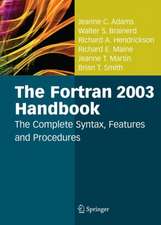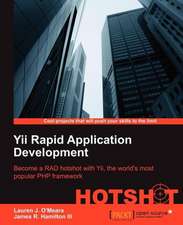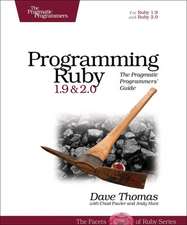Fundamentals of Programming Languages
Autor E. Horowitzen Limba Engleză Paperback – 7 dec 2011
Preț: 339.80 lei
Preț vechi: 424.75 lei
-20% Nou
Puncte Express: 510
Preț estimativ în valută:
65.03€ • 67.64$ • 53.69£
65.03€ • 67.64$ • 53.69£
Carte tipărită la comandă
Livrare economică 14-28 aprilie
Preluare comenzi: 021 569.72.76
Specificații
ISBN-13: 9783642694080
ISBN-10: 364269408X
Pagini: 468
Ilustrații: XVI, 446 p.
Dimensiuni: 152 x 229 x 25 mm
Greutate: 0.62 kg
Ediția:2nd ed. 1984. Softcover reprint of the original 2nd ed. 1984
Editura: Springer Berlin, Heidelberg
Colecția Springer
Locul publicării:Berlin, Heidelberg, Germany
ISBN-10: 364269408X
Pagini: 468
Ilustrații: XVI, 446 p.
Dimensiuni: 152 x 229 x 25 mm
Greutate: 0.62 kg
Ediția:2nd ed. 1984. Softcover reprint of the original 2nd ed. 1984
Editura: Springer Berlin, Heidelberg
Colecția Springer
Locul publicării:Berlin, Heidelberg, Germany
Public țintă
ResearchCuprins
1. The Evolution of Programming Languages.- 1.1 Early History.- 1.2 Early Modern History.- 1.3 FORTRAN and ALGOL 60.- 1.4 The Stormy’ 60s.- 1.5 Advances in the’ 70s.- Concepts Discussed in This Chapter.- Exercises.- 2. The Challenge of Programming Language Design.- 2.1 Criteria for Language Design.- 2.2 Some Possible Solutions.- Concepts Discussed in This Chapter.- Exercises.- 3. Defining Syntax.- 3.1 The Character Set.- 3.2 BNF.- 3.3 Syntax Graphs.- 3.4 Syntax and Program Reliability.- Concepts Discussed in This Chapter.- Exercises.- 4. Variables, Expressions and Statements.- 4.1 Variables and the Assignment Statement.- 4.2 Binding Time and Storage Allocation.- 4.3 Constants and Initialization.- 4.4 Expressions.- 4.5 Conditional Statements.- 4.6 Iterative Statements.- 4.7 The GOTO Statement and Labels.- 4.8 A First Look at Ada.- Concepts Discussed in This Chapter.- Exercises.- 5. Types.- 5.1 Data Types and Typing.- 5.2 Enumerated Data Types.- 5.3 Elementary Data Types.- 5.4 Pointer Data Type.- 5.5 Structured Data Types.- 5.6 Type Coercion.- 5.7 Type Equivalence.- 5.8 A Look at Ada and Types.- Concepts Discussed in This Chapter.- Exercises.- 6. Scope and Extent.- 6.1 The Basics.- 6.2 Run-time Implementation.- 6.3 An Extended Example.- 6.4 Binding, Scope and Extent Revisited.- 6.5 A Look at Ada and Scope.- Concepts Discussed in This Chapter.- Exercises.- 7. Procedures.- 7.1 General Features.- 7.2 Parameter Evaluation and Passing.- 7.3 Call-By-Name.- 7.4 Specification of Objects in a Procedure.- 7.5 Aliasing.- 7.6 Overloading.- 7.7 Generic Functions.- 7.8 Coroutines.- Concepts Discussed in This Chapter.- Exercises.- 8. Data Abstraction.- 8.1 An Introduction.- 8.2 MODULA.- 8.3 Euclid.- 8.4 Ada.- 8.5 SIMULA 67.- 8.6 Abstract Data Types.- Concepts Discussed in ThisChapter.- Exercises.- 9. Exception Handling.- 9.1 Design Issues.- 9.2 PL/I ON-Conditions.- 9.3 Exception Handling in CLU.- 9.4 Exception Handling in MESA.- 9.5 Exception Handling in Ada.- Concepts Discussed in This Chapter.- Exercises.- 10. Concurrency.- 10.1 Basic Concepts.- 10.2 Semaphores.- 10.3 Monitors.- 10.4 Message Passing.- 10.5 Concurrency in Ada.- Concepts Discussed in This Chapter.- Exercises.- 11. Input-Output.- Concepts Discussed in This Chapter.- Exercises.- 12. Functional Programming.- 12.1 What is Functional Programming.- 12.2 The Basics of LISP.- 12.3 The LIST Interpreter.- 12.4 FUNARGs and FEXPRs.- 12.5 The PROG Feature.- 12.6 Delayed Evaluation.- Concepts Discussed in This Chapter.- Exercises.- 13. Data Flow Programming Languages.- 13.1 The Data Flow Model.- 13.2 Language Design Goals.- 13.3 VAL—A Data Flow Programming Language.- Concepts Discussed in This Chapter.- Exercises.- 14. Object Oriented Programming Languages.- 14.1 History.- 14.2 Division of Smalltalk into Programming Language and User Interface.- 14.3 Smalltalk: Object Oriented Programming Language.- 14.4 Smalltalk: Object Oriented User Interface.- 14.5 Design Principles.- Concepts Discussed in This Chapter.- Exercises.- References.







